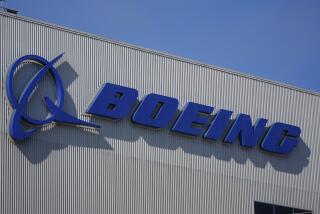Taiwan Balks at McDonnell Price : Aerospace: The island nation says it won’t pay $2 billion for a stake in the commercial aircraft division. One legislator derided the unit as “the rotten apple” of McDonnell Douglas.
- Share via
TAIPEI, Taiwan — The chairman of Taiwan Aerospace Corp. said Wednesday that the company won’t pay $2 billion for a stake in McDonnell Douglas’ commercial aircraft business and may try to renegotiate Taiwan’s investment in the Long Beach-based operations.
Taiwan Aerospace Chairman Earle J. S. Ho said the initially agreed upon price tag for 40% of Douglas Aircraft Co. was too high.
For the record:
12:00 a.m. May 1, 1992 For the Record
Los Angeles Times Friday May 1, 1992 Home Edition Business Part D Page 2 Column 6 Financial Desk 2 inches; 50 words Type of Material: Correction
Taiwan Aerospace--A story Thursday wrongly attributed to Taiwan Minister of Economic Affairs Vincent Siew a statement that the Taiwanese government would need to hold a 49% stake in Taiwan Aerospace Corp.’s planned investment in McDonnell Douglas’ commercial aircraft operations. The statement was made by Earle J. S. Ho, chairman of Taiwan Aerospace.
“The $2-billion amount is not written in stone,” he told reporters after addressing a hearing of Taiwan’s legislature. “I can go out on a limb and say that at that price, we cannot buy it.”
During the hearing, Minister of Economic Affairs Vincent Siew urged the legislators to support some sort of transaction with an eye to the island nation’s future development.
“It has a low financial return and high market risk, but the investment will boost this country’s technology and upgrade related industries,” he said.
Opposition legislators criticized a government report on the proposed deal, saying that the study’s projection of a 30% market share for the joint venture’s proposed jet, the MD-12, overstated its prospects.
They also attacked the transaction’s cost, saying that poor sales and bad management at Douglas Aircraft make a 40% stake worth much less than $2 billion.
“The commercial aircraft division is the rotten apple of McDonnell Douglas,” legislator Peng Pai-hsien said. “Nobody wants it.”
A McDonnell Douglas spokesman said the company realized a deal with Taiwanese investors would take time.
“An awful lot is at issue here, and an awful lot has to be done to reach an agreement,” spokesman John Thom said in Long Beach. “We think it’s going to be good for both sides, and we have high hopes that it’ll be completed.”
The legislative hearing began at 9 a.m and ended inconclusively about 6 p.m., with about one-third of the legislators still waiting to ask questions. Another session may be scheduled; whether the legislators need ultimately to approve the deal will depend on what shape it takes.
Several legislators from the ruling Nationalist Party expressed support for the proposed investment but concern about the financial stability of McDonnell. Though McDonnell has recovered from its cash flow crisis of just over a year ago, some called on the government to take measures to ensure the success of Taiwan’s part of the investment in the event of the firm’s bankruptcy.
Legislator Lin Yu-hsiang said the government’s military aviation development center should be turned into a civilian company and take the lead in developing the local industry in order to decrease any reliance on McDonnell.
“We hope to decrease the amount of investment in McDonnell Douglas and increase the investment in (other) production capacity,” Lin said. “That way, if McDonnell Douglas goes under, we still have facilities here to use.”
In his report to the legislators, Siew said that Taiwan Aerospace--a government-backed company formed last year to enter into the joint venture with McDonnell--and other private companies should take the lead in negotiating with McDonnell, but he reserved a role for the government as well.
Initially, he said, “the government will need to have a 49% share” in the Taiwanese investment, but could reduce its stake if the venture went smoothly.
Siew said that the government would take a “guiding” role--which might mean favorable loans, tax incentives or direct investment through a government development fund.
But some legislators opposed the notion of government involvement. Nationalist Party legislator Yu Mu-ming sits on the board of Taiwan Aerospace but nonetheless criticized the proposal.
“With such high risks involved, the government should not invest,” Yu said.
Responding to questions from legislators on how McDonnell would use the money invested by Taiwan, Siew said the Taiwanese investors would insist that it be used for development of the MD-12 and not simply to pay off McDonnell’s debt.
In a related development, the local press reported that Taiwan President Lee Teng-hui has expressed support for the proposed investment.
Coupled with the resignation earlier this month of former Taiwan Aerospace Chairman David Huang, who was unpopular with many legislators, Lee’s support has helped sway many legislators who previously had been opposed to the investment, the Chinese-language Economic Daily News reported.
The Associated Press contributed to this report.
More to Read
Inside the business of entertainment
The Wide Shot brings you news, analysis and insights on everything from streaming wars to production — and what it all means for the future.
You may occasionally receive promotional content from the Los Angeles Times.








